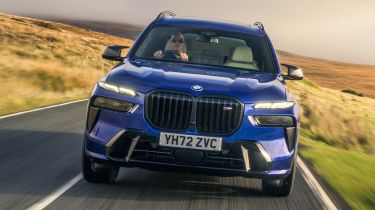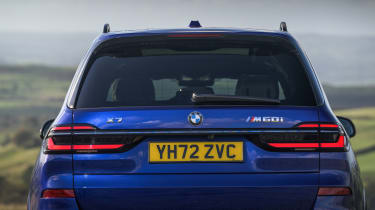BMW X7 review - MPG, CO2 and running costs
The BMW X7 is a large, expensive car with running costs to match – regardless of which engine you pick

The BMW X7 is not a car that’s likely to be bought with running costs in mind, although this hasn’t reduced pressure on BMW to work on reducing its fuel consumption and emissions. Entry-level 40i and 40d models will set you back nearly £87,000, with the top-flight M60i starting from just over £110,000. Choosing a few of the pricey option packs will see these figures jump further.
The most efficient model in the range is, predictably, the xDrive40d. It manages up to 36.2mpg on the combined cycle and emits from 202g/km of CO2 – not terrible for a car of this size and weight.
Petrol power brings higher fuel consumption and emissions: xDrive40i models return up to 27.7mpg and 232g/km of CO2, while the V8-powered M60i is claimed to be a little more efficient that M50i model it replaces; 23.7mpg versus 22.6mpg, and 278g/km of CO2 instead of 284g/km.
Company car users will have to brace themselves for big bills – all models sit in the uppermost 37 per cent Benefit in Kind percentage charge bracket. Private owners will be liable to pay large first-year VED payments (usually rolled into the on-the-road prices), plus a £355 surcharge on top of the £165 base-rate per year. This will bring road tax bills in years two to six of ownership to £520 per year.
Used - available now
Notable by its absence in the range is a plug-in hybrid variant of the X7 – rivals including the XC90 and Range Rover offer this option and can be driven on electric power alone over shorter distances. If you plan to spend most of your time in town, it’s worth considering these alternatives.
Insurance groups
The high-cost theme continues when it comes to insurance, with all models occupying insurance group 50 – the highest possible. By contrast, the XC90 spans groups 38 to 45 and the Land Rover Discovery groups 33 to 42. Look at the X7’s high-end rivals such as a full-size Range Rover or Bentley Bentayga, and they also sit in the top insurance group.
Depreciation
Our experts predict that the X7 will retain a decent chunk of its value after three years and 36,000 miles, but the fact remains that those buying brand new will stand to lose around £40,000 to depreciation over that period.
Depending on spec, the X7 should hold on to around 48-55 per cent of its original value come trade-in time – with xDrive40i M Sport versions expected to fare best. Models specified with the expensive Ultimate Pack will, on average, fare slightly worse over the three year period – holding onto around 48 per cent of their original list price.














